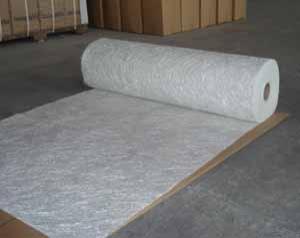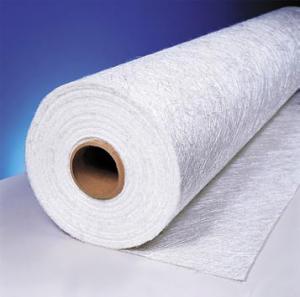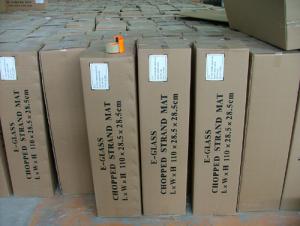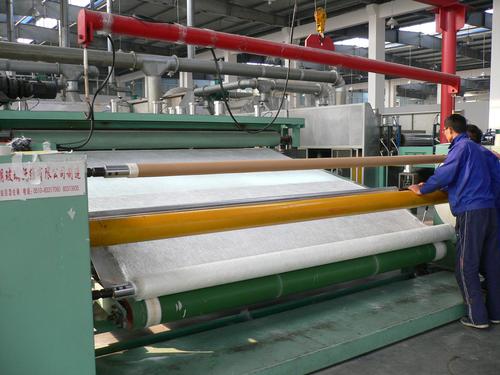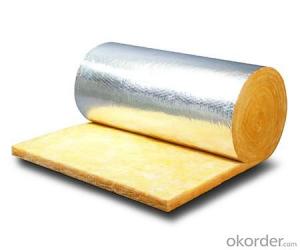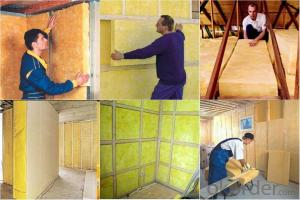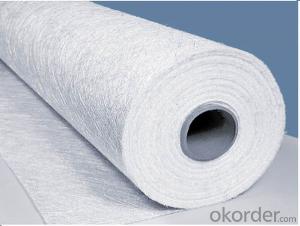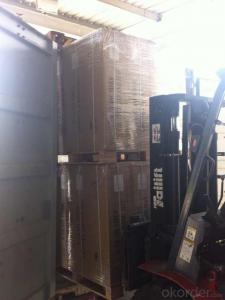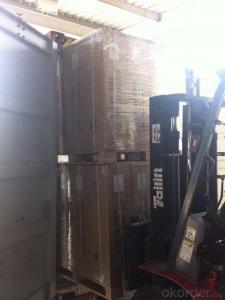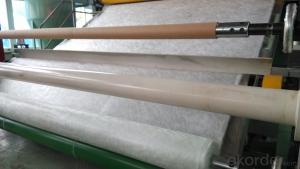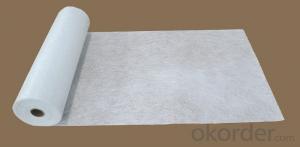Fiberglass Mat Tissue E-Glass Chopped Strand Mat Emulsion Bonded
- Loading Port:
- China Main Port
- Payment Terms:
- TT or LC
- Min Order Qty:
- -
- Supply Capability:
- 1500ton m²/month
OKorder Service Pledge
OKorder Financial Service
You Might Also Like
Emulsion Binder E glass Chopped Strand Mat
Product description of Fiber Glass Powder Emulsion Chopped Strand Mat
Glass Fiber Emulsion Binder Chopped Strand Mat is an unwoven fabrics consisting of randomly distributed chopped strands held together with Emulsion Binder.
Emulsion Binder Chopped Strand Mats are compatible with unsaturated polyester, vinyl ester, phenol and epoxy resins.
The products are widely used in hand lay-up process and can also be used in compression molding and continuous laminating process and hand layup process. The typical end-use applications include various panels, boats, bathroom accessories, automotive parts and cooling towers.
Specification of Emulsion Binder E-Glass Chopped Strand Mat
Property Glass type Weight(g/m2) Width 200~3300 Roll Weight Moisture Content /% Combustible Content /% Breakage Strength /N Test Method GB/T 1549 ISO3374:2000 ISO3374 GB/T17470-1998 ISO3344:1997 ISO1887:1995 ISO3342 EMC 80 E-GLASS 80±16 ±5 6~50 <0.2 13.6±0.35 ≥200 EMC 100 E-GLASS 100±10 ±5 6~65 <0.2 9.5±0.35 ≥170 EMC 150 E-GLASS 150±15 ±5 6~97 <0.2 8.0±0.35 ≥40 EMC 225 E-GLASS 225±22 ±5 6~150 <0.2 5.0±0.6 ≥60 EMC 300 E-GLASS 300±30 ±5 6~180 <0.2 4.0±0.6 ≥90 EMC 450 E-GLASS 450±45 ±5 6~180 <0.2 3.8±0.6 ≥120 EMC 600 E-GLASS 600±60 ±5 6~240 <0.2 3.6±0.6 ≥150 EMC 900 E-GLASS 900±90 ±5 6~190 <0.2 3.4±0.6 ≥180
Characteristics of Emulsion Binder E Glass Chopped Strand Mat
1.Uniform density ensures consistent fiberglass content and mechanical properties of the composites products;
2.Uniform powder distribution ensures good mat integrity, little loose fibers and small roll diameter;
3.Excellent flexibility ensures good mold ability with no spring back at sharp angles;
4.Fast and consistent wet-out speed in resins and rapid air lease reduce resin consumption and production cost, and enhances productivity and mechanical properties of the end products.
5, The composite products have high dry and wet tensile strength and good transparency.
6, Optional for high strength with stiff mat for panel laminating and midle strength with soft mat for hand layup.
Package:
1, the Mat roll will be wrapped in PVC/PE film, then packed with carton boxes;
2, Vertically placed on bottom pallets by:
4 rolls*4 rolls or 4 rolls* 5rolls
Horizontally placed on upper pallets by:
3 rolls*4 rolls
3, the whole pallet will be fasten by PVC strips;
4, the whole pallets will be wrapped by strentchable PE film.
FAQ:
1. Why Choose us?
CNBM is a stated own company, provide the guarantee for the best quality, best service and safety business. 2. How will we guarantee the quality? a, ISO 9001-2008 quality control system; b, Strict and regular quality control in production; c, Inspeciation when loading into container before shippment; d, Sample stock for one year for quality tracing and record. 3. What is your MOQ? Our MOQ is one pallet. 4. Can you provide sample? Yes, we can offer free sample for you. 5. Payment terms? We can accept L/C, T/T etc. 6. Do you offer OEM service? Yes, we can print customers’ logo on the packaging; And the size and specification can be produced and design according to your demand. 7. What is the Production Lead Time? 1 *40HQ each day.
8. What kind of standard of the mat?
ISO9001-2008
GS Certificate (special for automotive industries)
DNV Certificate (Special for Marine)
LIyod
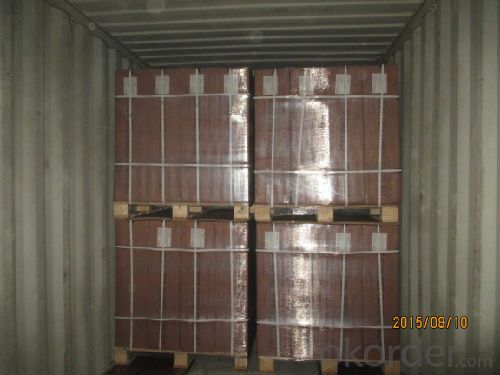
- Q: How does the cost of fiberglass mat tissue compare to other reinforcement materials?
- The cost of fiberglass mat tissue generally tends to be more affordable compared to other reinforcement materials. Fiberglass mat tissue is widely used in various industries, such as construction and automotive, due to its cost-effectiveness. Other reinforcement materials like carbon fiber or aramid fibers can be significantly more expensive, making fiberglass mat tissue a preferred choice for many applications that require reinforcement. Additionally, fiberglass mat tissue offers excellent strength and durability, making it a cost-effective solution for projects that require reliable reinforcement without breaking the budget.
- Q: Does fiberglass mat tissue require any special precautions during storage?
- Special precautions are necessary when storing fiberglass mat tissue. Fiberglass is a delicate material that can easily be damaged if not stored correctly. Here are some precautions to keep in mind: 1. Maintain dry conditions: It is important to store fiberglass mat tissue in a dry, moisture-free environment. Excessive moisture can compromise its strength and integrity. 2. Avoid direct exposure to sunlight: The UV rays from sunlight can gradually degrade fiberglass. To prevent damage, store the material in a cool, shaded area away from direct sunlight. 3. Shield from dust and dirt: To maintain its effectiveness, fiberglass mat tissue should be stored in a clean, dust-free environment. Dust and dirt particles can become embedded in the material and reduce its efficiency. 4. Steer clear of extreme temperatures: Extreme heat or cold can also have an impact on the quality of fiberglass mat tissue. It is advisable to store it in an environment with controlled temperatures to prevent any potential damage. 5. Proper packaging: If the fiberglass mat tissue comes with packaging, it is recommended to keep it in its original packaging for added protection. If not, consider using a durable, moisture-resistant wrapping material. By adhering to these precautions, you can ensure that your fiberglass mat tissue remains in optimal condition during storage and is ready for use whenever necessary.
- Q: Is fiberglass mat tissue resistant to compression?
- Indeed, compression resistance is a quality possessed by fiberglass mat tissue. Comprising numerous layers of delicate glass fibers that are bound together by a binder, this material exhibits exceptional structural integrity and strength. Consequently, it can endure substantial loads without distorting or compromising its shape. This remarkable attribute renders fiberglass mat tissue highly sought-after in numerous sectors, including construction, automotive, aerospace, and marine industries, where resistance to compression is imperative. Furthermore, fiberglass mat tissue is renowned for its exceptional dimensional stability, which further augments its ability to withstand compression.
- Q: Does fiberglass mat tissue provide good fire protection?
- No, fiberglass mat tissue does not provide good fire protection.
- Q: Does fiberglass mat tissue provide any mold resistance?
- No, fiberglass mat tissue does not provide any mold resistance.
- Q: Does fiberglass mat tissue provide good moisture control?
- Yes, fiberglass mat tissue does provide good moisture control. It is a highly effective material that helps to prevent moisture build-up and condensation by providing a barrier against water intrusion. Additionally, it helps to improve the overall insulation of the structure, further enhancing moisture control.
- Q: What is the expected lifespan of fiberglass mat tissue in cryogenic applications?
- The expected lifespan of fiberglass mat tissue in cryogenic applications can vary depending on various factors such as the specific temperature, exposure time, and the quality of the material. However, in general, fiberglass mat tissue is known for its durability and resistance to extreme temperatures, making it suitable for long-term use in cryogenic applications. With proper installation and maintenance, it can potentially last for several years or even decades in such environments.
- Q: What is the flexural strength of fiberglass mat tissue?
- The flexural strength of fiberglass mat tissue refers to its ability to resist bending or flexing without breaking. It is typically high due to the reinforcing properties of the fiberglass material, making it suitable for applications requiring structural integrity and resistance to deformation.
- Q: Is fiberglass mat tissue resistant to chemicals?
- Yes, fiberglass mat tissue is generally resistant to chemicals. It is commonly used in applications where chemical resistance is required, such as in the construction of chemical storage tanks or pipes. However, the specific resistance of fiberglass mat tissue to different chemicals may vary, so it is important to consult the manufacturer's specifications for the intended chemical environment.
- Q: Can fiberglass mat tissue be used for repairing automotive parts?
- Yes, fiberglass mat tissue can be used for repairing automotive parts. Fiberglass mat tissue is a versatile material that is commonly used for reinforcing and repairing various surfaces, including automotive parts. It is particularly useful for repairing parts that are made of fiberglass, such as car bodies and panels. Fiberglass mat tissue is a thin and flexible material that is made up of randomly oriented fiberglass strands. It is designed to be easily molded and shaped to fit the contours of the damaged automotive part. The mat tissue is typically applied with a resin, such as polyester or epoxy, which binds the fibers together and creates a strong and durable repair. When used for automotive repairs, fiberglass mat tissue provides several benefits. Firstly, it is lightweight, which is important for maintaining the overall weight and balance of the vehicle. Additionally, it is resistant to corrosion and can withstand exposure to various weather conditions, making it suitable for all types of automotive repairs. Moreover, fiberglass mat tissue is known for its high tensile strength, which means that it can withstand the stresses and strains that automotive parts may experience during normal use. This makes it an ideal choice for repairing damaged or weakened areas, such as cracks, holes, or dents in car bodies or panels. In conclusion, fiberglass mat tissue can be effectively used for repairing automotive parts, especially those made of fiberglass. Its versatility, lightweight nature, resistance to corrosion, and high tensile strength make it an excellent choice for restoring the structural integrity and appearance of damaged automotive parts.
Send your message to us
Fiberglass Mat Tissue E-Glass Chopped Strand Mat Emulsion Bonded
- Loading Port:
- China Main Port
- Payment Terms:
- TT or LC
- Min Order Qty:
- -
- Supply Capability:
- 1500ton m²/month
OKorder Service Pledge
OKorder Financial Service
Similar products
Hot products
Hot Searches
Related keywords

